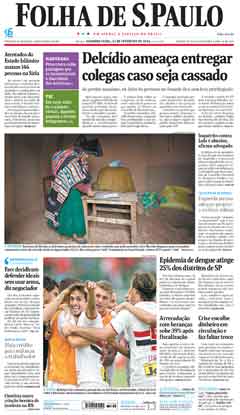Publicidade
Publicidade
Weakened drug gangs create vacuum that can be filled by militias
Publicidade
FROM RIO
Rio de Janeiro's Security Secretariate does not identify a link between the defeat suffered by drug gangs in the Complexo do Alemão area and the strengthening of armed militias. But the fact that the area --described by secretary José Mariano Beltrame as the "heart of evil"-- was re-conquered shows the drug gangs to be vulnerable, while militia members have been advancing in terms of organized crime.
 See the map of violence in Rio
See the map of violence in Rio
For the anthropologist Luiz Eduardo Soares, coordinator of Security, Justice and Citizenship during the government of Anthony Garotinho (1999-March 2000) and national Public Security secretary during the Lula administration (in 2003), "the type of drug trade that is a feature of Rio is in decline".
Soares co-authored "Elite da Tropa 2", that focuses on the advance of militiamen (police officers, firemen and prison guards who charge a fee from inhabitants of their areas in exchange for "protection").
In an article published in his blog, Soares says that "the polarity alluded to in the question (police versus drug gangs) hides the true problem: that there is no such polarity. To create it --in other words, to separate criminals from police officers, to distinguish crime from police-- should be the most important and urgent goal of any security policy worthy of the name. There is no significant modality of criminal action in Rio which does not include corrupt segments of the police."
According to him, the drug gangs are unable to compete with the militias, since the latter profit from drug dealing and many other activities as well, such as supplying gas and cable TV illegally. "The model of armed drug gangs, based on territorial dominance, is outdated and anti-economic: it costs money to maintain an army, recruit rookies, supply them with weapons (none of this is needed in the case of the militias, since they are made of police officers)," says the anthropologist.
Cláudio Ferraz, co-author of "Elite da Tropa 2" and Civil Police chief who heads the fight against the militias, reinforces Soares' arguments: "The militias don't need to make any investments. All they do is charge money." Ferraz says that constant care is needed to avoid militias occupying new territories.
Until the offensive in Complexo do Alemão and Vila Cruzeiro, militias dominated 41.5 per cent of Rio's 1,006 slums; drug gangs lorded over 55.9 per cent, and the UPPs (Pacifying Police Units) were in charge of 2.6 per cent, according to data obtained by the Nupevi (Nucleus of Research on Violence of the State University of Rio de Janeiro). Established by governor Sérgio Cabral (PMDB), the UPPs were supposedly what motivated the recent attacks.
"The militias continue to grow. What they have lost is political representation and public acceptance," says the state deputy Marcelo Freixo (PSOL), who headed the Parliamentary Inquiry Commission on Militias in 2008, alluding to the arrests of town councilor Jerônimo Guimarães in 2007, who at the time belonged to the PMDB, and to state deputy Natalino Guimarães (formerly of DEM) in 2008.
+ Notícias sobre a violência do Rio
- Morre segurança atingido durante confronto no morro do Alemão
- Complexo do Alemão tem madrugada tranquila e escolas voltam a funcionar
- Polícia destruiu TVs, dizem moradores do Complexo do Alemão
- Tráfico em baixa dá espaço a milícias, diz ex-secretário nacional de Segurança
- Rio vai oficializar pedido para que Forças Armadas continuem policiamento
+ Notícias em Cotidiano
- Termina hoje inspeção de veículos com placas de final 9 em São Paulo
- Trem da CPTM apresenta problema na linha 8-Diamante
- Manutenção deve deixar 650 mil moradores de Guarulhos (SP) sem água
- Material explosivo é apreendido ao lado de penitenciária em Franco da Rocha (SP)
- Dois suspeitos de roubo morrem em troca de tiros na zona oeste de SP
+ Livraria
- Box de DVD reúne dupla de clássicos de Andrei Tarkóvski
- Como atingir alta performance por meio da autorresponsabilidade
- 'Fluxos em Cadeia' analisa funcionamento e cotidiano do sistema penitenciário
- Livro analisa comunicações políticas entre Portugal, Brasil e Angola
- Livro traz mais de cem receitas de saladas que promovem saciedade
Publicidade
As Últimas que Você não Leu
Publicidade
+ LidasÍndice
- Sem PM nas ruas, poucos comércios e ônibus voltam a funcionar em Vitória
- Sem-teto pede almoço, faz elogios e dá conselhos a Doria no centro de SP
- Ato contra aumento de tarifas termina em quebradeira e confusão no Paraná
- Doria madruga em fila de ônibus para avaliar linha e ouve reclamações
- Vídeos de moradores mostram violência em ruas do ES; veja imagens
+ Comentadas
- Alessandra Orofino: Uma coluna para Bolsonaro
- Abstinência não é a única solução, diz enfermeira que enfrentou cracolândia
+ EnviadasÍndice



